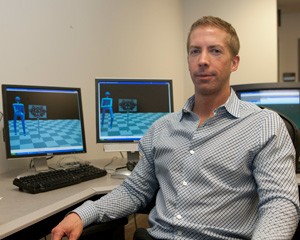
Sigma Xi Honoree Kevin Shockley Pushes Perceptions about Psychology
Wii remote controllers, virtual reality headgear, treadmills and motion-sensor bodysuits make Kevin Shockleys research labs look more like a videogame testing facility than a university laboratory. And while they may be just as fun, these tech devices are far from toys.
Rather, they are the instruments Shockley and others in the
use to study groundbreaking research about coordination, movement and cognition.
So groundbreaking in fact that Shockley spends much of his time explaining what his research is and how it relates to psychology.
Its a growing area of understanding in the field, he says. When you think about psychologists, you dont think much about action or movement but thats really at the heart of my interest and what people in my area are working to understand.
As an associate professor in the University of Cincinnatis
, Shockley has been intricately involved in the trailblazing efforts. Since earning his PhD in 2002 from the University of Connecticut and coming to UC, he has worked tediously in the field, publishing 50 peer-reviewed articles, 15 book chapters and acquiring nearly $2 million in government research grants.
Even though hes still early mid-career, he has had a considerable influence on the scholarly direction of the psychology department over the last several years, says Psychology Department Head and Professor Steven Howe. Hes a creative and influential scientist, an outstanding classroom instructor, and does great work as the graduate director for our
program.
Shockley has conducted research that ranges a number of topics, but he is often hailed for his impact in two areas: haptic perception and interpersonal movement coordination.
Haptic perception, knowing about objects through touch, is a narrowly understood phenomenon in the field of experimental psychology even

Kevin Shockley, PhD
though the sense is used constantly in our everyday lives. But using virtual reality technology in his experiments, Shockley has developed a multi-modally specified inertia model which demonstrates that people can see heaviness similarly to how they feel it by touching and that these two modes of perceiving are based in the same basic principles of physics.
In his other experiments about interpersonal movement coordination, Shockley observed synchronized movements between two conversants.
When people communicate with one another, they tend to coordinate their movements. This isnt trivial because when you inhibit peoples movements, they actually have trouble thinking or communicating, Shockley explains. My research team is working to understand how your coordination with other people actually influences your ability to effectively communicate with them.
Both of these areas of research have been funded by the National Science Foundation.
Perhaps an even more interesting aspect of his research is the quantitative tools Shockley and his team use to understand the complex data they collect. Using nonlinear methods like mathematics of recurrence quantification analysisusually utilized in fields like physiologyShockley has been able to turn the abstract science of the mind into a language consistent with natural law.
His research on coordination of bodily movements between two people, including the development of time series analysis methods suitable for objectively and precisely quantifying these patterns of coordinated movement, has revolutionized this field of study and has had a broad impact, garnering the attention of not only his like-minded colleagues, but also earning praise from cognitive scientists who hold opposing theoretical positions, says Psychology Professor Michael Riley.
The methods have proven to be so effective in experimental psychology, Shockley and his colleagues in UCs Center for Cognition, Action and Perception annually host an
on the methods sponsored by the American Psychological Association. Every year researchers from around the world visit UC to learn the nonlinear methods Shockley introduced to the behavioral sciences.
And Shockleys service to the field doesnt stop there. He serves on the editorial board of Frontiers in Movement Science and Sport Psychology, and as a consulting editor of the Journal of Experimental Psychology: Human Perception and Performance. He has been a panelist for both the National Institutes of Health and the National Science Foundation, and reviews grant proposals for NSF. In 2010 he was named an Erskine Fellow at the University of Canterbury in New Zealand and was the inaugural speaker at the newly created New Zealand Institute of Language Brain and Behavior.
On March 10, Shockley received the 2011 Young Faculty Investigator Award at the
2011 Future Symposium. The award given by UCs scientific research society goes to a junior faculty member with distinguished research in a field of science and engineering.
Its an exhaustive list of accomplishments for a researcher who arrived at UC in 2002. But Shockley is quick to give credit to his colleagues in the psychology department for his achievements.
Theyve been extremely instrumental in my career, Shockley says. This really has been a team effort for how my career has played out so far, and I have no illusions that I would not have been as successful without these people contributing to my career.
This is honestly my dream job. I could not have written a better job description for myself.
Getting to play with the tech toys? Thats just a bonus.
Related Stories
UC’s spring Visiting Writers Series promises robust, diverse...
December 20, 2024
Lovers of literature, poetry and the written word can look forward to a rich series of visiting writer presentations, offered through UC’s College of Arts and Sciences department of English, coming this spring.
Should voters have more say in Ohio's Legislature?
December 19, 2024
UC Professor David Niven talks to WVXU about gerrymandering in Ohio.
How tadpoles make the leap to frogs
December 18, 2024
In his biology lab, UC Professor Daniel Buchholz and his students are using a National Science Foundation grant to study the hormones that trigger metamorphosis in frogs.
